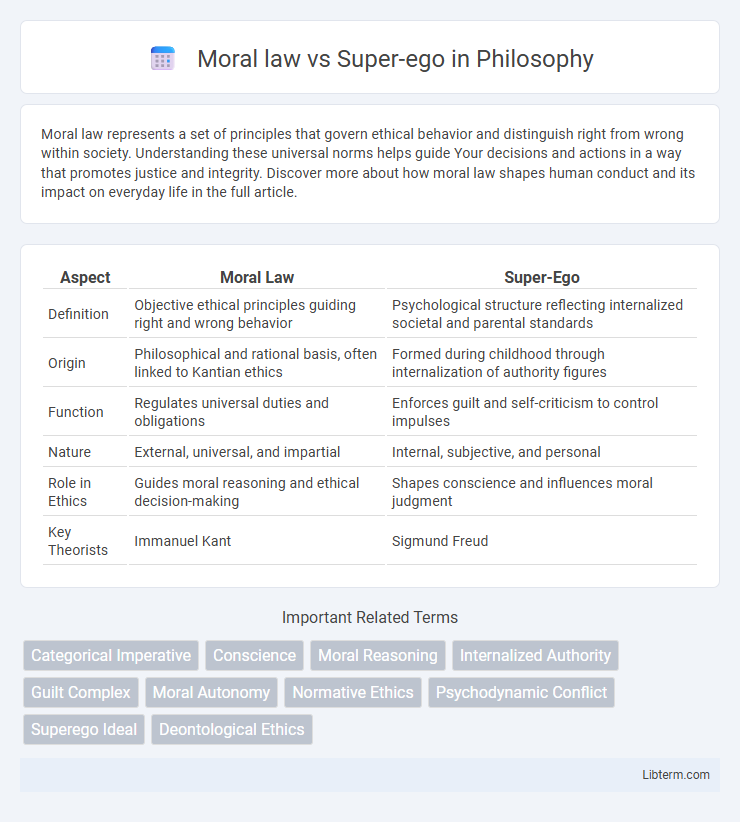Moral law represents a set of principles that govern ethical behavior and distinguish right from wrong within society. Understanding these universal norms helps guide Your decisions and actions in a way that promotes justice and integrity. Discover more about how moral law shapes human conduct and its impact on everyday life in the full article.
Table of Comparison
| Aspect | Moral Law | Super-Ego |
|---|---|---|
| Definition | Objective ethical principles guiding right and wrong behavior | Psychological structure reflecting internalized societal and parental standards |
| Origin | Philosophical and rational basis, often linked to Kantian ethics | Formed during childhood through internalization of authority figures |
| Function | Regulates universal duties and obligations | Enforces guilt and self-criticism to control impulses |
| Nature | External, universal, and impartial | Internal, subjective, and personal |
| Role in Ethics | Guides moral reasoning and ethical decision-making | Shapes conscience and influences moral judgment |
| Key Theorists | Immanuel Kant | Sigmund Freud |
Defining Moral Law: Universal Principles
Moral law refers to universal principles that govern notions of right and wrong, independent of individual opinions or cultural differences, often rooted in ethical philosophy and religious doctrines. These principles serve as a foundation for objective moral judgments, contrasting with the super-ego, which is a psychoanalytic construct representing internalized societal norms and parental authority. While moral law embodies absolute ethical standards, the super-ego functions as a personal conscience shaped through social experience.
Understanding the Super-Ego: Freud’s Perspective
The Super-Ego, according to Freud, functions as an internalized moral authority shaped by parental and societal standards, guiding behavior through feelings of guilt and pride. It operates alongside the Id and Ego, imposing ethical constraints that reflect learned values and ideals. Understanding the Super-Ego highlights its role in regulating impulses by enforcing moral judgments rooted in early childhood experiences.
Origins of Moral Law in Philosophy
The origins of moral law in philosophy trace back to Immanuel Kant's concept of the categorical imperative, which establishes universal ethical principles derived from reason rather than experience. Freud's super-ego, conversely, represents internalized societal norms and parental authority shaping the individual's conscience through psychoanalytic theory. These frameworks collectively highlight the intersection of philosophical rationalism and psychological development in understanding moral law.
The Formation of the Super-Ego in Childhood
The formation of the super-ego in childhood is heavily influenced by the internalization of moral law, which originates from parental authority and societal norms. Through processes like identification and introjection, children adopt these external rules as internal standards that regulate behavior and conscience. This internalized moral law becomes the foundation of the super-ego, guiding feelings of guilt and pride in response to actions.
Moral Law vs. Super-Ego: Core Differences
Moral law represents universal ethical principles grounded in cultural, religious, or philosophical norms, guiding individuals toward socially accepted behaviors and distinguishing right from wrong. The super-ego, a psychoanalytic construct developed by Freud, functions as the internalized voice of parental and societal standards, regulating behavior through feelings of guilt and pride. Unlike moral law's external and often codified nature, the super-ego operates within the unconscious mind as a personalized moral compass shaped by early experiences and emotional conditioning.
Internalization of Societal Norms
Moral law represents the universal principles of right and wrong that govern human behavior, often derived from cultural and religious teachings. The super-ego, a key component of Freud's psychoanalytic theory, embodies the internalized societal norms, values, and prohibitions absorbed from parents and authority figures during childhood. This internalization process forms the super-ego's regulatory role, enforcing moral standards and generating feelings of guilt or pride based on adherence to the moral law.
Psychological Functions of Moral Law and Super-Ego
The moral law functions as an internalized set of ethical standards guiding behavior through conscience and guilt, serving to regulate actions in accordance with cultural and societal norms. The super-ego, a key component of Freud's psychoanalytic theory, acts as the mind's moral overseer by enforcing these internalized standards, creating feelings of pride when rules are followed and guilt when they are violated. Together, the moral law and super-ego maintain psychological equilibrium by balancing instinctual desires with socially acceptable conduct, promoting self-control and moral judgment.
Conflicts Between Personal Morality and Super-Ego Demands
Conflicts between personal morality and super-ego demands arise when individual values clash with the internalized societal rules embedded in the super-ego, leading to psychological tension. The super-ego, representing parental and cultural authority, often imposes strict standards that may contradict personal ethical beliefs. This dissonance can result in guilt, anxiety, or repression as one struggles to reconcile inner convictions with external moral expectations.
Moral Autonomy Versus Social Conditioning
Moral law represents an individual's capacity for moral autonomy, guiding ethical behavior through internal principles rather than external influences. The super-ego functions as a psychological structure shaped largely by social conditioning, internalizing societal norms and expectations to regulate behavior. The tension between moral autonomy and the super-ego reflects the conflict between personal ethical judgment and socially imposed moral standards.
Integrating Moral Reasoning and Psychological Well-being
Moral law represents objective ethical principles guiding human behavior, while the super-ego reflects internalized societal norms influencing the psyche. Integrating moral reasoning with the super-ego enhances psychological well-being by fostering coherent self-regulation and reducing internal conflict. This integration supports adaptive decision-making processes crucial for mental health and moral development.
Moral law Infographic

 libterm.com
libterm.com